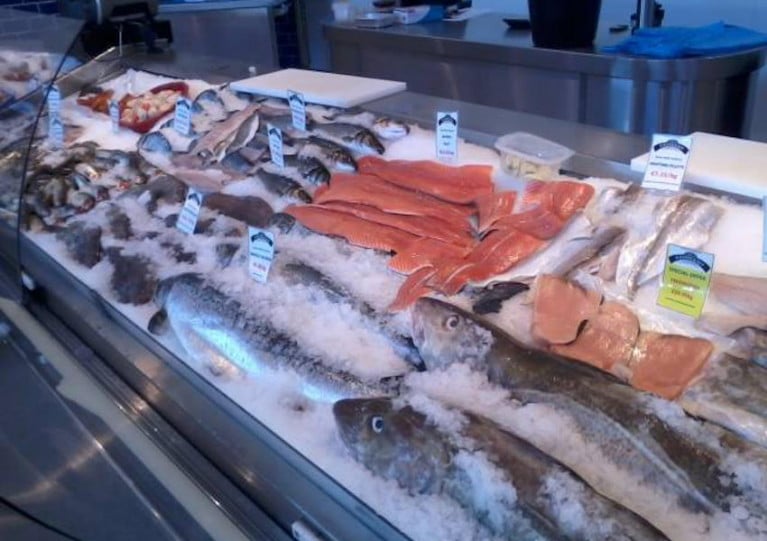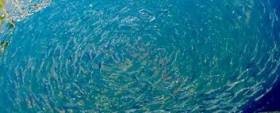Displaying items by tag: Seafood Processing
Making Seafood Processing Greener with Rainwater Harvesting
BIM, Ireland's Seafood Development Agency, are hosting a Rainwater Harvesting Webinar for Irish Seafood Processing businesses to examine the benefits of adopting rainwater harvesting systems on site and provide opportunities for improving water management and reducing water costs.
The free webinar will take place on Thursday 25th March at 13.00 and all seafood processors are welcome to register their attendance.
The event is being hosted by BIM, in conjunction with our Water Stewardship Programme partners, Central Solutions and is just one of a series of sustainable resource management webinars which BIM’s Green Seafood Business Programme will be hosting over the coming year. Other areas addressed under the Programme are the efficient management of energy, waste, and emissions.
Speaking in advance of the event, Martina O’Brien, Green Programme Co-ordinator, BIM said, “Water is a shared natural resource and is essential to everything we do in the seafood sector. However, its supply is limited, and this will pose a major challenge in the coming decade. We must act now to ensure we understand the potential risks to seafood businesses and identify sustainable solutions to this significant issue. This Rainwater Harvesting webinar is an opportunity to gain awareness around sustainable water management, develop a better understanding of water use on your site, and identify potential cost savings opportunities in relation to water use.”
The live-streamed event will include speakers from BIM, Central Solutions, Ireland’s water management specialists, members of the seafood processing sector, and BIM.
To register for the webinar, click here
€1m in Seafood Processing Grants to Support €4.9m in New Investments by Nine Companies
The Minister for Agriculture, Food and the Marine, Charlie McConalogue T.D., today announced €4.9 million in new investment by nine seafood processing companies, with his department’s European Maritime and Fisheries Fund Programme providing grants of €1,011,184. The grants are co-funded by the Government of Ireland and the European Union and are subject to terms and conditions.
Announcing the grants, Minister McConalogue said, “I am very pleased to support these nine seafood enterprises to further grow their business. These are particularly challenging times with both Covid and Brexit impacting on markets and the ongoing capital investment by our seafood sector is evidence of its resilience and its optimism for future growth prospects.”
Minister McConalogue added, “My Department’s European Maritime and Fisheries Fund Programme has provided in excess of €230 million over the past seven years to support the sustainable growth of our seafood sector. A new Seafood Development Programme for the 2021-27 period is presently being drafted and I expect it to commence later this year.”
Grant approvals - Seafood Processing Capital Investment Scheme
|
Beneficiary |
County |
Project Description |
Total Investment |
Grant |
|
Good Fish Processing Ltd |
Cork |
Management Information system |
€140,759 |
€42,228 |
|
Castletownbere Fishermens Co-operative Society Ltd |
Cork |
Spiral freezer, deheading machine and associated works |
€859,157 |
€257,747 |
|
Nicky’s Plaice Ltd |
Dublin |
Ice Machine and Pin Boner Investment |
€41,000 |
€9,900 |
|
Kerry Fish (Ire) Unlimited Company |
Kerry |
Reconfiguration of High Care department and purchase of automated smoked salmon slicing line. |
€723,746 |
€185,775 |
|
Dundalk Bay Seafoods Ltd |
Louth |
Investment in Efficient & Environmentally Friendly Retail Production Line |
€64,700 |
€19,410 |
|
Senahoek Trading Ltd |
Cork |
Construction of factory including Cold Store |
€2,989,091 |
€448,364 |
|
Total: |
€4,818,453 |
€963,424 |
Grant approvals – Seafood Processing Innovation Scheme
|
Beneficiary |
Location |
Project Description |
Total Investment |
Grant |
|
Goatsbridge Fish Processors Ltd |
Kilkenny |
Business Strategy – Advisory services enhancing financial planning and company structure in Ireland and UK |
€39,000 |
€19,500 |
|
Sofrimar Unlimited Company |
Wexford |
Trials and rental of equipment for converting waste products to powder for use in horticulture. |
€56,520 |
€28,260 |
|
Total: |
|
€95,520 |
€47,760 |
Marine Marine Charlie McConalogue has announced €4.8 million in new investment by eight seafood processing companies, with his department’s European Maritime and Fisheries Fund Programme (EMFF) providing more than €1.4 million in grants.
The grants amounting to €1,408,949 are funded half-and-half by the Government and European Union and are subject to terms and conditions.
Announcing the grants, Minister McConalogue said 2020 “has been a difficult year for our seafood sector, as it has for our economy as a whole.
“So, it is heartening to see many of our leading seafood processors continue to invest to further grow their businesses. I am delighted to support these eight seafood processors in building for the future.
“Although the processing sector continues to face challenges, with the pandemic continuing to impact on world markets and uncertainties and risks around the ongoing trade negotiations with the UK, there are also many opportunities to continue to develop and prosper, as companies adapt and innovate to unlock the market opportunities that are available for quality Irish seafood products.”
The minister added that the EMFF remains “open for business” and continues to provide grants for a wide range of investments in Ireland’s seafood sector “including capital investment, innovation, business planning and marketing”.
The latest funding boost for the sector follows €3.5 million invested in six seafood processing companies in June, and a €3.4 million investment across 15 aquaculture enterprises in July.
Among the eight beneficiaries in this latest round of investment, Co Cork-based Good Fish Processing and Keohane Seafood also received grants in the June funding announcement.
Grant approvals - Seafood Processing Capital Investment Scheme 2020
|
Beneficiary |
Location |
Project |
Total Investment |
EMFF Grant |
|
Bio-marine Ingredients Ireland Ltd. |
Monaghan |
Automated Powder Bagging System and associated modifications. |
€153,691 |
€46,107 |
|
Rockabill Seafood Ltd. |
Dublin |
Air purifier and crab labelling system |
€153,281 |
€43,918 |
|
Shellfish De La Mer |
Cork |
Airflow, cooler and conveyor systems, and steam cooker |
€442,590 |
€130,723 |
|
Atlantis Seafood Wexford Ltd.
|
Wexford |
White fish filleting line & Skin Packer |
€715,685 |
€214,706 |
|
Kish Fish Company Ltd.
|
Dublin |
Blast chill, packing room, vacuum packing machine |
€30,825 |
€9,248 |
|
Good Fish Processing (Carrigaline) Ltd.
|
Cork |
White fish filleting line |
€1,511,444 |
€449,979 |
|
Keohane Seafoods Unlimited
|
Cork |
Salmon processing equipment and factory reconfiguration |
€1,712,709 |
€463,899 |
|
Breizon Ltd. |
Galway |
Reduction in energy costs through solar PV installation |
€93,799 |
€14,070 |
|
Total: |
|
€4,814,024 |
€1,372,649 |
Grant approvals – Seafood Innovation and Business Planning Scheme
|
Beneficiary |
County |
Project |
Total Investment |
EMFF Grant |
|
Keohane Seafoods Unlimited
|
Cork |
Management and business planning consultancy |
€72,600 |
€36,300 |
|
Total: |
|
|
€72,600 |
€36,300 |
€1.8m Aquaculture & Seafood Processing Grants Awarded
Minister for Agriculture Food and the Marine, Michael Creed T.D. today announced the award of over €1.8 million in grants to 19 seafood enterprises under the European Maritime and Fisheries Fund (EMFF) Operational Programme for the seafood sector. The grants are co-funded by the Exchequer and the EMFF.
Minister Creed said, “Against the Brexit backdrop and its potential implications for our food exports, I am particularly pleased to see so many seafood enterprises continuing to invest in growing their production, developing new consumer products and growing and diversifying markets, something I witnessed first hand during my recent Trade Mission to the Gulf States. My Department’s EMFF seafood development programme is providing a suite of 3 development schemes for our seafood processing sector that aim to incentivize seafood innovation and new product development, support capital investment in state of the art equipment to add value to raw material and to give processors the tools to diversify and develop their export markets. In this first of a series of grant approvals for 2017, grant aid of almost €900,000 has been awarded to 7 seafood processors supporting in excess of €3 million in value adding capital investment, while grant aid of €824,000 has been awarded to 8 aquaculture enterprises supporting capital investment of €2.8 million that will directly contribute to growing output from these farms in the coming years and help achieve the ambitious sustainable growth targets we have set for our aquaculture sector”.
Minister Creed added, “I have provided Bord Iascaigh Mhara (BIM) with €26 million of EMFF funds in 2017 and I expect to announce many more awards as the year progresses”
|
Beneficiary |
County |
Total Investment |
Grant Approved |
|
Dunns Seafare Ltd. |
Dublin |
€522,176 |
€148,726 |
|
Seafood Processors Ltd. |
Louth |
€72,968 |
€21,890 |
|
Keohane Seafoods Ltd. |
Cork |
€77,426 |
€23,227 |
|
Bio-Marine Ingredients Ireland Ltd. |
Monaghan |
€1,799,821 |
€510,000 |
|
Sofrimar Ltd. |
Wexford |
€375,780 |
€112,734 |
|
Shellfish De La Mer |
Cork |
€179,730 |
€53,919 |
|
Albatross Seafoods Ltd. |
Donegal |
€66,000 |
€14,100 |
|
TOTAL |
|
€3,093,901 |
€884,596 |
Grant approvals - Seafood Scaling & New Market Development Scheme
|
Beneficiary |
County |
Total Investment |
Grant Approved |
|
Connemara Producers Group |
Mayo / Galway |
€114,022 |
€57,011 |
|
TOTAL |
|
€114,022 |
€57,011 |
Grant approvals - Seafood Innovation & Business Planning Scheme
|
Beneficiary |
County |
Total Investment |
Grant Approved |
|
Ocean Farm Ltd. |
Donegal |
€19,070 |
€9,535 |
|
Atlantis Seafoods |
Wexford |
€16,300 |
€8,150 |
|
Kish Fish Company |
Dublin |
€20,700 |
€10,350 |
|
Bio-Marine Ingredients Ireland Ltd. |
Monaghan |
€25,000 |
€12,500 |
|
Keohane Seafoods Ltd. |
Cork |
€40,000 |
€20,000 |
|
TOTAL |
|
€121,070 |
€60,535 |
Grant approvals - Sustainable Aquaculture Scheme
|
Beneficiary |
County |
Total Investment |
Grant Approved |
|
Bells Isle Seafoods Ltd |
Donegal |
€400,753 |
€160,301 |
|
Blackshell Farm Ltd |
Mayo |
€101,942 |
€40,776 |
|
Comhlucht Iascaireacht Fanad Teo |
Donegal |
€1,057,145 |
€317,143* |
|
Feirm Farraige Oilean Chliara Teo |
Donegal |
€923,161 |
€276,948* |
|
Huitre Du Connemara |
Louth |
€61,825 |
€24,730 |
|
Michael Lydon |
Galway |
€74,440 |
€29,776 |
|
Mannin Seafoods Ltd |
Cork |
€31,885 |
€12,754 |
|
Atlantic Maritime Ltd |
Mayo |
€139,470 |
€55,788 |
|
TOTAL |
|
€2,790,621 |
€824,125 |































































